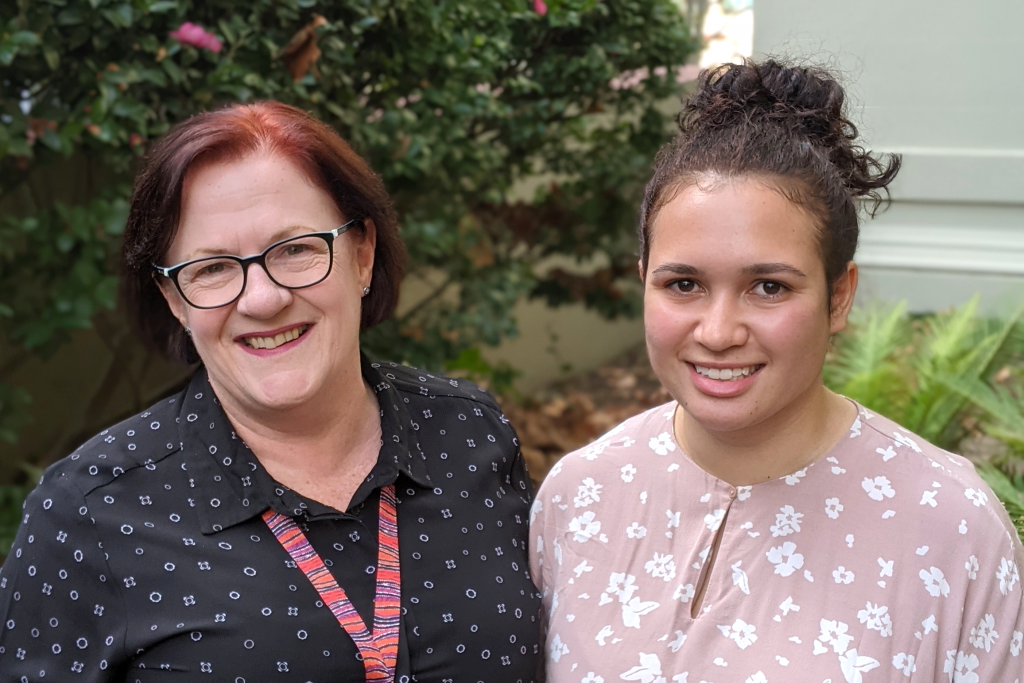
Vivica Turnbull is a Barkindji/Ngamba woman from Bourke in her first year of a Bachelor of Biodiversity and Conservation at Macquarie University, Sydney. Lorrae Collins is the Congregational Finance Director for the Sisters of St Joseph of the Sacred Heart. Lorrae’s husband Paul and Vivica’s father Bruce met while Bruce was a student of St Ignatius’ College, Riverview, and began a long association between the two families.
Vivica: I chose to do Biodiversity mostly because of my upbringing in Bourke and my mum – she did some work in the National Parks. I think it’s really important work. It’s also part of my culture as well, taking care of country and wanting to be part of that history and story. I’d like to go into National Parks management, maybe in conservation policy making.
We have a community at Macquarie Uni called Walanga Muru. That’s the Wallumadegal term for “Follow your path.” They’re an official club in the university and there’s quite a lot of us from a diverse range of places. Some from the Northern Territory and WA and the Torres Strait. In my college on campus there’s quite a big population of Indigenous students too. There’s about 15 of us in the first year.
I’ve noticed that the other students are always asking us questions and seem really interested. We’ve had a few smoking ceremonies and have been doing some weaving classes. The interest is definitely genuine and very respectful.
We also have Indigenous faculty as well, mostly women, and a Dean around college who’s an Indigenous woman as well. It’s great to see because Indigenous culture is very matriarchal.
To me, Reconciliation means making amends for the early Australian colonial history and the trauma that was inflicted upon us. We need to take steps to put Indigenous people on an equal playing field as non-Indigenous people.
It’s time to take some action because I think we’ve talked enough about it. For instance, there’s been a lot of media recently about Aboriginal incarceration and deaths in custody. There’s just been a commission on deaths in custody in New South Wales and I think that there needs to be some justice brought to those families
I feel like we’re making empty promises at the moment. And there are too many non-Indigenous people trying to take the reins. We need more Indigenous people to be involved and in centre focus. Our voices are not really being heard.
Lorrae: I think Reconciliation has to become a lens through which we all live in Australia. We have to understand that care of country is one of the most important parts of our culture. We have so much to learn from the Traditional Owners. Organisations proactively developing Reconciliation Action Plans is a positive step, but Reconciliation can’t just be about a piece of paper.
What Viv has experienced is a huge step forward compared to when I was in school. My daughter Kate is studying midwifery in Darwin, because at Charles Darwin University there’s a big emphasis on Indigenous women’s health. Her pracs and everything are all working with young Indigenous women having babies. That’s down to the education she’s had and also the opportunities that we’ve had as a family to learn from being part of Viv’s life and her family’s life.
I feel very honoured to have played a role in Viv’s life and honoured that she calls me “Aunty” and calls my husband “Uncle”. And our two daughters are her sisters. It’s a very close bond with the whole family that started because Viv and her Dad had the opportunity to be educated in big Catholic institutional schools. That’s been a positive pathway – a meeting point. Personally, my Catholic faith has also helped me with Reconciliation, both my Mary MacKillop and Ignatian spirituality – being men and women for others and “Never see a need without doing something about it.”
I think that this next generation is going to have a very different experience to ours.
